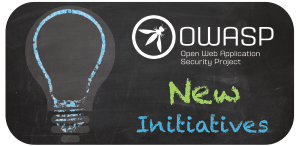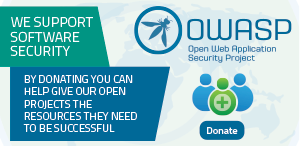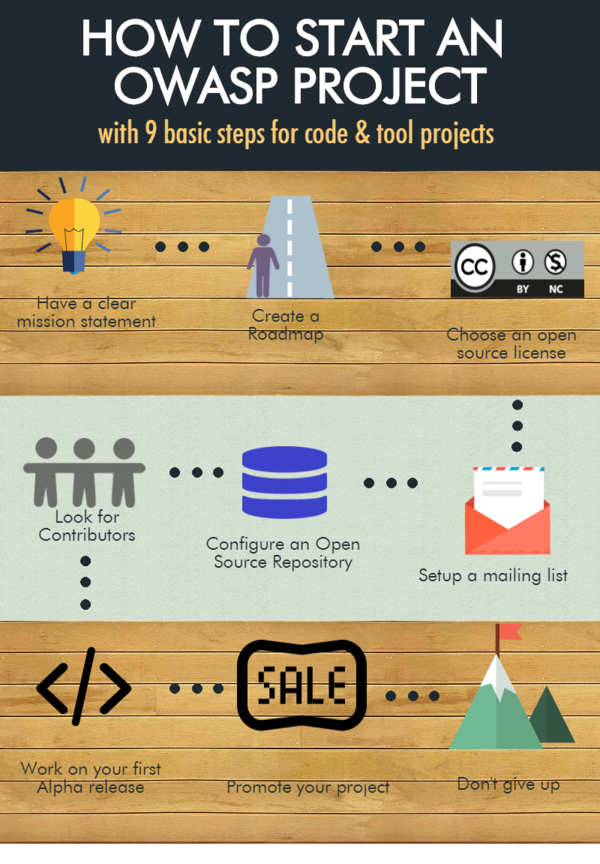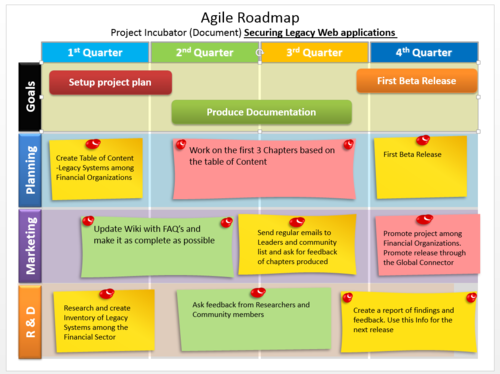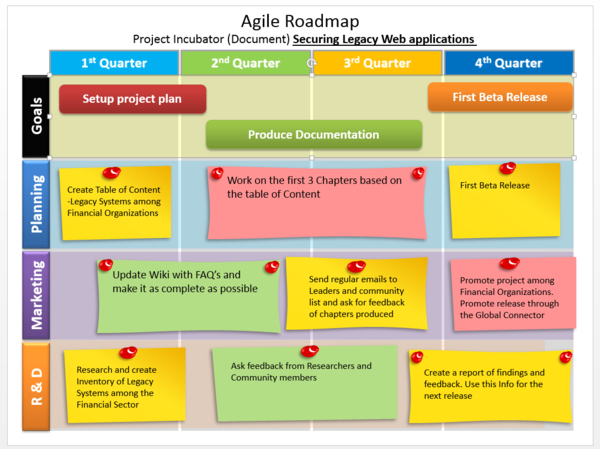This site is the archived OWASP Foundation Wiki and is no longer accepting Account Requests.
To view the new OWASP Foundation website, please visit https://owasp.org
Category:OWASP Project
| |
|
|---|---|
- Welcome
- Project Inventory
- Project Task Force
- Online Resources
- Starting a New Project
- Project Assessments
- Brand Resources
- Terminology
- Sponsorships and Donations
- Contact US
|
|
The Project Dashboard lists the all project information at a glance, including release links, the current status of the project and project leader contact information. The Project Dashboard can be found here: https://www.owasp.org/index.php/OWASP_Project_Dashboard
Flagship Projects
The OWASP Flagship designation is given to projects that have demonstrated strategic value to OWASP and application security as a whole. After a major review process [More info here] the following projects are considered to be flagship candidate projects. These project will be evaluated more deeply to confirm their flagship status:
Tools [Reviewed September 2014]
Code [Reviewed November 2014]
Documentation[Reviewed February 2015] in progress
- OWASP Application Security Verification Standard Project
- OWASP Software Assurance Maturity Model (SAMM)
- OWASP AppSensor Project
- OWASP Top Ten Project
- OWASP Testing Guide Project
Labs Projects
OWASP Labs projects represent projects that have produced a deliverable of value. While these projects are typically not production ready, the OWASP community expects that an OWASP Labs project leader is producing releases that are at least ready for mainstream usage.
Thumbs up
Thumbs up are given to LAB projects showing a steady progress in their development, had very active and continuous releases and commits, regular update of information on their wiki page and have quite complete documentation. These projects are almost ready to become flagship
Tools [Reviewed February 2015]
- OWASP Hackademic Challenges Project
- OWASP Mantra Security Framework
- OWASP O2 Platform
- OWASP Dependency Track Project
- OWASP WebGoat Project
- O-Saft
- OWASP EnDe Project
- OWASP Passfault
- [|OWASP Mobile Security Project]
- OWASP Xenotix XSS Exploit Framework
Documentation [In Progress-Results by February/March 2015]
- OWASP Podcast Project
- OWASP Code Review Guide Project
- OWASP Development Guide Project
- OWASP CISO Survey
- OWASP Application Security Guide For CISOs
- OWASP Cornucopia
- OWASP Cheat Sheets Project

Contests
Code [Reviewed February 2015]
Low Activity (LABS)[Reviewed February 2015]
These projects had no releases in at least a year, however have shown to be valuable tools Code [Low Activity]
Documentation [Low Activity]
- OWASP AppSec Tutorial Series
- OWASP Legal Project
- Virtual Patching Best Practices
- OWASP Codes of Conduct
- OWASP Secure Coding Practices - Quick Reference Guide
Incubator Projects
OWASP Incubator projects represent the experimental playground where projects are still being fleshed out, ideas are still being proven, and development is still underway. The “OWASP Incubator” label allows OWASP consumers to readily identify a project’s maturity. The label also allows project leaders to leverage the OWASP name while their project is still maturing.
Thumbs up
Thumbs up are given to incubator projects showing a steady progress in their development, had continuous releases and commits or have delivered a complete product, including open source repository location, basic user guidelines and documentation
Code [Reviewed March 2015]
- OWASP Java Encoder Project

- OWASP Java File I/O Security Project
- OWASP PHPRBAC Project
- OWASP iMAS - iOS Mobile Application Security Project

- OWASP PHP Security Project


- OWASP Node.js Goat Project

- OWASP System Vulnerable Code Project
- OWASP ISO/IEC 27034 Application Security Controls Project
- OWASP Hardened Phalcon Project
- OWASP Faux Bank Project

- OWASP Security Research and Development Framework

- OWASP File Format Validation Project
- OWASP Wapiti Project
Tools [Review in progress-March 2015]
- OWASP Java HTML Sanitizer Project

- OWASP Security Shepherd

- OWASP Mantra OS

- OWASP iGoat Project
- OWASP Bricks
- OWASP Bywaf Project
- OWASP Mutillidae 2 Project
- OWASP SeraphimDroid Project

- OWASP Python Security Project
- OWASP WebSpa Project

- OWASP NINJA PingU Project
- OWASP Encoder Comparison Reference Project
- OWASP sqliX Project
- OWASP Click Me Project

- OWASP Secure TDD Project

- OWASP XSecurity Project
- OWASP Pyttacker Project
- OWASP Code Pulse Project

- OWASP HTTP POST Tool
- OWASP PHP Security Training Project
- OWASP iOSForensic
- OWASP Project Metrics
- OWASP Store Sheep Project
- OWASP SonarQube Project
- OWASP Rainbow Maker Project

- OWASP JSEC CVE Details

- OWASP WebGoat.NET

- OWASP ASIDE Project

- OWASP Assesment Tool
Documentation[Review: March 2015-In progress]
- OWASP Data Exchange Format Project
- OWASP Proactive Controls

- OWASP Enterprise Application Security Project
- OWASP GoatDroid Project
- OWASP Request For Proposal
- OWASP Hacking-Lab
- WASC/OWASP Web Application Firewall Evaluation Criteria (WAFEC)
- OWASP Secure Application Design Project
- OWASP Top 10 Fuer Entwickler Project
- OWASP Security Principles Project
- OWASP Media Project

- OWASP Global Chapter Meetings Project
- OWASP Vulnerable Web Applications Directory Project
- OWASP Insecure Web Components Project
- OWASP Reverse Engineering and Code Modification Prevention Project
- OWASP Student Chapters Project
- OWASP Education Project
- OWASP Speakers Project
- OWASP Internet of Things Top Ten Project
- OWASP .NET Project
- OWASP Open Cyber Security Framework Project
- OWASP Top 10 Privacy Risks Project
- OWASP WASC Web Hacking Incidents Database Project
- OWASP Security Frameworks Project
- OWASP Incident Response Project
- OWASP Embedded Application Security
- OWASP STING Game Project
- OWASP Ruby on Rails and Friends Security Guide
- OWASP Secure Development Training
- OWASP Periodic Table of Vulnerabilities
- OWASP Top Trumps for Projects
- OWASP Supporting Legacy Web Applications in the Current Environment Project
- OWASP KALP Mobile Project
- OWASP Persian Translation Project
- OWASP Security Controls in Web Application Development Lifecycle Project
- OWASP_Application_Security_Program_Quick_Start_Guide_Project
- OWASP_Secure_Configuration_Guide
- OWASP_Product_Requirement_Recommendations_Library
- OWASP_Knowledge_Based_Authentication_Performance_Metrics_Project
Educational Project
Donated Projects
OWASP Donated Projects are inactive projects that have been donated to the OWASP Projects Infrastructure.
Tools
OWASP Archived Projects
OWASP Archived Projects are projects that have developed outside OWASP umbrella or have become inactive. If you are interested in pursuing any of the inactive projects (click hyperlink for list), please contact us and let us know of your interest.
https://www.owasp.org/index.php/Category:OWASP_Project_Archived_Projects
OWASP Project Task Force
This task force is focused on OWASP Projects with a first focus on cleaning up the OWASP incubator list
Project Online Resources
This page is for OWASP project leaders and details some of the online services that have been found to be useful for OWASP projects.
How to Run a Successful Open Source Project
http://www2.econ.iastate.edu/tesfatsi/ProducingOSS.KarlFogel2005.pdf
GitHub
OWASP is a registered Organisation on GitHub, a free, public directory of Free and Open Source Software and the contributors who create and maintain it.
If you manage an OWASP project you should:
- Register yourself on GitHub
- Request that your repository get created by a GitHub admin and that you are made an admin on the repository
- Check that the settings are correct for your repositor
Other Free Services
These are all free to open source projects.
- http://crowdin.net/ a translation and localization management platform
- https://scan.coverity.com/ C/C++/C# and Java static source code analysis
Other Paid For Services
Open for Suggestions and depending on your project budget and/or *Community Engagement Funding.
- Please note: Th cost may be covered by the Community Engagement Funding up to $500 if it meets the policy requirements.
If it is more than $500 or outside policy guidelines, it would require special approval by our Executive Director.
So you want to start a project...
Starting an OWASP project is quite easy, and your desire to contribute and make it happen is essential.
Here are some of the guidelines for running a successful OWASP project:
-Start exploring the actual OWASP projects Inventory. Many projects handle specific areas of security it is a good idea to start looking how other successful projects do this (LABS/Flagship)
-Place your idea or project on the Project Ideas Board.This phase will help you to define the project goals and also explore and exchange with other OWASP leaders and volunteers how to develop the idea into a tangible project
-Explore and research if your idea covers a unique segment in the Security arena.Think of your project as a product, if you really want people using it, think how this project will cover a necessity in the security area you are working on
-Define what kind of project you would like to start. Is it a code, tool or documentation?
-Communicate through the Project leader mailing list about your idea and get feedback and meet potential contributors
-Develop your project based on the type of project. For example if you are willing to start a documentation project, begin by defining a Table of Content and work it through with potential contributors. First of all begin by creating a Road-map for your project. This is essential to submit your project. We highly recommend to read documentation such as "How to start /run a successful Open Source Projects".
Importance of a well thought out Road-map
Many Incubator project leaders struggle with creating a realistic planning, which should be based on their available resources and time. A well thought out plan makes a difference between a procrastinating project and a successful one. The important aspect of this is, that the project leader is able to create a plan based on his situation. The following is an example of a Roadmap, which has focused to produce a Documentation first release in a year and a basic outline how they plan to cover 4 essential aspects which are Research & Development, Marketing, Planning and Goals.
"Your [project] roadmap should tell a coherent story about the likely growth of your product. Each release should build on the previous one and move you closer towards your vision. Your roadmap should be convincing and realistic: Don’t speculate or oversell your [project]. Be clear who your audience is: An internal roadmap talks to development, marketing, sales, service, and the other groups involved in making your [project] a success; and external one talks to existing and prospective customers." Extracted from : "[10 Tips for Creating an Agile Product Roadmap]"
- Start defining a development, documentation and marketing plan for your project. Set short , medium and long term plans. Include promotion of your project, this is very important in order to engage users and consumers of your project. Contact project coordinator and the Project Task Force to help you achieve this goal. You can run a single person project, but it's usually best to get the community involved. You should be prepared to support a mailing list, build a team, speak at conferences, and promote your project.
- You can contribute existing documents or tools to OWASP! Assuming you have the intellectual property rights to a work, you can open it to the world as an OWASP Project. Please coordinate this with OWASP by contacting owasp(at)owasp.org.
- Available Grants to consider if you need funding - Click Here
- You should promote your project through the OWASP channels as well as by outside means. Get people to blog about it!
Creating a new project
Once you have passed the Project Ideas phase, then you will be ready to start a new project To Submit your project please use the following form . Please submit a new project application here.
- You will need to gather the following information together for your application:
A - PROJECT
- Project Name,
- Project purpose / overview,
- Project Roadmap,
- Project links (if any) to external sites,
- [[Guidelines_for_OWASP_Projects#Project_Licensing|Project License],]
- Project Leader name,
- Project Leader email address,
- Project Leader wiki account - the username (you'll need this to edit the wiki),
- Project Contributor(s) (if any) - name email and wiki account (if any),
- Project Main Links (if any).
- For Documentation: A table of Contents
- For Code: A prototype hosted in an open source repository of your choice. Make sure it has read access.
- Check out the Guidelines for OWASP Projects.
- Grant Spending Policy
- Project Spending Policy
- Project Sponsorship Operational Guidelines
OWASP Recommended Licenses
Why are you recommending these licenses?
Which other open source licenses are eligible for an OWASP project?
Choosing a license under which an artifact is distributed and enforcing the license are prerogatives of the copyright holders over that artifact. By default, each contributor is copyright holder over the contributed piece. Contributors must all agree on the license and cooperate in enforcing it or must assign their copyright to the entity which becomes responsible for choosing and enforcing the license.
OWASP is a collaborative initiative for the public good and most of its output is expected to be functional, rather than aesthetic. The problem OWASP tackles is so large that OWASP acknowledges a need to collaborate with the commercial world. Therefore, in order to become an OWASP Sponsored Project, you should be comfortable with:
- Allowing arbitrary uses for your work, for example for commercial purposes. (If you disagree, consider using CC-BY-NC.)
- Revealing to the world your project's source code (its form preferred for modification).
- Allowing your work, under certain conditions (see below), to be modified by others and redistributed. (If you disagree, consider using CC-BY-ND.)
| Artifact | Under what conditions can your work be modified and redistributed? | |||
|---|---|---|---|---|
| As long as modifications are licensed in the same spirit | If credit is appropriately given to you | Under any circumstances | ||
| Standalone Tool | Run locally |
|
|
|
| Consumed over the network |
| |||
| Library |
| |||
| Document (includes E-Learning, presentations, books etc.) |
|
| ||
Funding your Project
An OWASP project does not receive any funding for development at project inception; however, a new project does have the opportunity to submit a request to receive funds if they are available for the year. Additionally, project leaders have the option of seeking sponsorship from outside organizations, but project leaders are required to seek funding through their own initiative. Please contact the OWASP Projects Manager for more information.
Project Release
As your project reaches a point that you'd like OWASP to assist in its promotion, the will need the following information to help spread the word about your project:
- Short 5 sentence paragraph outlining what your project is about, what you hope to accomplish with your project, what value your project brings to software security, and contributor and project leader names and contact information.
- Link to your wiki page.
- Link to your code repository or a link to where readers can download your project.
- Latest Release description answering the following questions: What is it?, What does it do?, Where can I get it?, Who should I contact if something goes wrong?.
Project Process Forms
These forms were created to help project leaders, and those interested in a going through a process in the OWASP projects infrastructure. They facilitate the management of each query based on the specific task an applicant will need help with. The forms are described below, and they are linked with their designated online application form.
- Project Transition Application:The OWASP project transition form gives current project leaders an easy way of handing over project administration information to individuals wishing to take over a project.
- Project Review Application:This form is for current project leaders to request a review of their project based on OWASP graduation criteria. The aim is to designate an OWASP volunteer to review these projects within 3 months time.
- Project Donation Application:This form is for projects outside of the OWASP project infrastructure. Project Leaders for these open source projects can choose to partner or give their project to OWASP directly through this form.
- Project Adoption Request:This form is used when someone is interested in adopting an archived project.
- Project Abandonment Request:The OWASP project abandonment form gives current project leaders an easy way of letting the OWASP Foundation know that they wish to resign their project leader duties. This form should be used when no replacement project leader exists to take over these duties.
- Incubator Project Graduation Application:This application form is for Incubator Projects to apply for Labs Project status.
OWASP Project Lifecycle
The OWASP Projects Lifecycle represents a balance between keeping a very loose structure around OWASP projects, and ensuring that OWASP consumers are not confused about a project’s maturity and quality. The lifecycle stage allows consumers to easily identify mature projects, and projects that are proofs of concept, experimental, and classified as prototypes in their current state. The greater the maturity of the project, the greater the level of responsibility for the project leader. These responsibilities are not trivial as OWASP provides incentives and benefits (Section 7) for projects who take on these added responsibilities.
The OWASP Project Lifecycle is broken down into the following stages:
Incubator Projects: OWASP Incubator projects represent the experimental playground where projects are still being designed, ideas are still being proven, and development is still underway. The “OWASP Incubator” label allows OWASP consumers to readily identify a project’s maturity; moreover, the label allows project leaders to leverage the OWASP name while their project is still maturing. OWASP Incubator projects are given a place on the OWASP Projects Portal to leverage the organizations' infrastructure, and establish their presence and project history.
Lab Projects: OWASP Labs projects represent projects that have produced a deliverable of significant value. Leaders of OWASP Labs projects are expected to stand behind the quality of their projects as these projects have matured to the point where they are accepted by a significant portion of the OWASP community. While these projects are typically not production ready, the OWASP community expects that an OWASP Labs project leader is producing releases that are ready for mainstream usage. OWASP Labs Projects are meant to be the collection of established projects that have gained community support and acclaim by undergoing the project review process.
Flagship Projects: The OWASP Flagship designation is given to projects that have demonstrated superior maturity, established quality, and strategic value to OWASP and application security as a whole. Eligible projects are selected from the OWASP Labs project pool. This selection process generally ensures that there is only one project of each type covering any particular security space. OWASP Flagship projects represent projects that are not only mature, but are also projects that OWASP as an organization provides direct support to maintaining. The core mission of OWASP is to make application security visible and so as an organization, OWASP has a vested interest in the success of its Flagship projects. Since Flagship projects have such high visibility, these projects are expected to uphold the most stringent requirements of all OWASP Projects.
OWASP Project Stage Benefits
This section outlines the benefits of starting an OWASP project, and the benefits of being at each different stage in the projects lifecycle. In my short time here at OWASP as the PM, I have had several potential project leaders ask me what the benefits are of starting their project with OWASP. Below is my proposal for each Stage’s benefits.
Incubator
- Financial Donation Management Assistance
- Project Review Support
- WASPY Awards Nominations
- OWASP OSS and OPT Participation
- Opportunity to submit proposal: $500 for Development.
- Community Engagement and Support
- Recognition and visibility of being associated with the OWASP Brand.
Labs
- All benefits given to Incubator Projects
- Technical Writing Support
- Graphic Design Support
- Project Promotion Support
- OWASP OSS and OPT: Preference
Flagship
- All benefits given to Incubator & Labs Projects
- Grant finding and proposal writing help
- Yearly marketing plan development
- OWASP OSS and OPT participation preference
For more detailed information on OWASP Project Stage Benefits, please see the 2013 Project Handbook.
Project Monitoring Incubator/Documentation
Every 6 months, a project monitoring assessment takes place to evaluate if projects had any releases during this period.A warning will be sent to projects without any activity in 90 days and after 180 days, the project will be set automatically as inactive. You can set your project active at any time, as long as:
- There has been commits to the project's open repository or
- There has been a beta release of the documentation produced so far or
- Provide a detailed Roadmap
Importance of a well thought out Roadmap
Many Incubator project leaders struggle with creating a realistic planning, which should be based on their available resources and time. A well thought out plan makes a difference between a procrastinating project and a successful one. The important aspect of this is, that the project leader is able to create a plan based on his situation. The following is an example of a Roadmap, which has focused to produce a Documentation first release in a year and a basic outline how they plan to cover 4 essential aspects which are Research & Development, Marketing, Planning and Goals.
"Your [project] roadmap should tell a coherent story about the likely growth of your product. Each release should build on the previous one and move you closer towards your vision. Your roadmap should be convincing and realistic: Don’t speculate or oversell your [project]. Be clear who your audience is: An internal roadmap talks to development, marketing, sales, service, and the other groups involved in making your [project] a success; and external one talks to existing and prospective customers." Extracted from : "[10 Tips for Creating an Agile Product Roadmap]"
Project Monitoring for LABS/Flagship
These project represent the best OWASP has to offer, therefore monitoring of these projects is closely supervised.
For Code and Tools
For projects holding Flagship status, we closely monitor their health every 6 months on the following, among other key indicators:
- Can the project be built correctly?
- Does the project has any activity(commits) in the last 6 months?
- Does the project had any releases in the last 6 months?
- Has the project leaders updated his wiki or website to reflect latest releases?
For Documentation
For this part, we are working on the development of an adequate assessment criteria The following is a draft of the new process proposal: [Proposal for Reviewing OWASP Document projects]
OWASP Project Graduation
The Project Graduation Process is an optional process undertaken at the request of a project leader using the Incubator Graduation Form. The purpose of this process is to move a project from the OWASP Incubator into the OWASP Labs. In order to be considered for OWASP Labs, an Incubator project must have submitted an OWASP reviewed deliverable, and obtained at least two (2) positive responses for each of the core criteria project health questions.
The review centers around the following core questions. Each core question has three (3) specific questions made up of binary queries. A project must receive at least two (2) positive responses from each reviewer in two of the binary questions, to warrant a postive response for the core question. Each core question must receive a positive response from both project reviewers to pass the Project Health Assessment for Incubator Projects.
OWASP Project Health Assessment
The Project Health Assessment is an optional process undertaken at the request of a project leader when he/she applies for Project Graduation for projects going from Incubator to LAB and from LAB to Flagship. The purpose of this assessment is to determine whether a project meets the minimum criteria of an OWASP Project outlined in the Project Health Assessment Criteria Document. If a project passes the assessment, it then becomes eligible to graduate into the OWASP Labs Project stage. In order to be considered for OWASP Labs, an Incubator project must have submitted an OWASP reviewed deliverable, and obtained at least two (2) positive responses for each of the core criteria project health questions.
OWASP Project Deliverable/Release Assessment
The Project Deliverable/Release Review is an optional process undertaken at the request of a project leader using the Project Deliverable Review Form. The purpose of this process is to review a project’s progress, and to make sure the project is heading in the right direction based on the roadmap they provided at project inception.
Reviews must be performed by two (2) OWASP Chapter or Project Leaders, and their review must answer affirmatively to at least the first two (2) core Project Deliverable/Release Review questions. A project must pass the OWASP Project Deliverable/Release Assessment in order to graduate into the OWASP Labs Project stage.
The Brand Usage Rules
See OWASP's The Brand Usage Rules for details.
Project Icons & Templates
See OWASP'S Project Icons & Templates for details.
(Following links and images are provided for a quick overview only, the primary page is Project Icons & Templates).
If you require more assistance with these files and/or templates, please contact the OWASP staff for assistance
OWASP Operational Wiki Template
OWASP Example Template: DO NOT EDIT
OpenSAMM
Construction:
Deployment:
Governance:
Verification:
Book Cover Files
See OWASP's Project Icons & Templates for details.
Download the Book Cover Zip File
| |
|
|---|---|
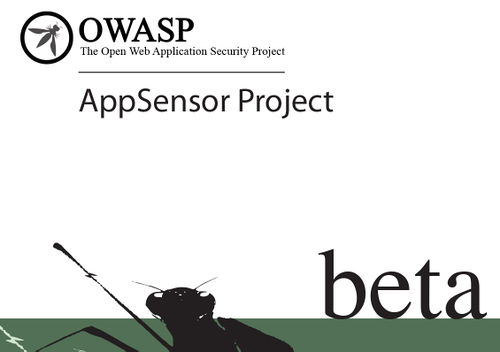
|
OWASP Project Infrastructure
- OWASP Project Lifecycle: The OWASP Projects Lifecycle represents a balance between keeping a very loose structure around OWASP projects, and ensuring that OWASP consumers are not confused about a project’s maturity and quality. The lifecycle stage allows consumers to easily identify mature projects, and projects that are proofs of concept, experimental, and classified as prototypes in their current state.
- Incubator Project: OWASP Incubator projects represent the experimental playground where projects are still being fleshed out, ideas are still being proven, and development is still underway. The “OWASP Incubator” label allows OWASP consumers to readily identify a project’s maturity. The label also allows project leaders to leverage the OWASP name while their project is still maturing.
- Labs Project: OWASP Labs projects represent projects that have produced a deliverable of value. While these projects are typically not production ready, the OWASP community expects that an OWASP Labs project leader is producing releases that are at least ready for mainstream usage.
- Flagship Project: The OWASP Flagship designation is given to projects that have demonstrated strategic value to OWASP and application security as a whole.
- Project Benefits: The standard list of resources and incentives made available to project leaders based on their project's current maturity level.
OWASP Project Reviews
- Project Reviews: Project reviews are the method OWASP uses to establish a minimal baseline of project characteristics and release quality. Reviews are not mandatory, but they are necessary if a project leader wishes to graduate to the next level of maturity within the OWASP Global Projects infrastructure. Projects can be reviewed when an Incubator project wishes to graduate into the OWASP Labs designation, and project releases can be reviewed if they want the quality of their deliverable to be vouched for by OWASP.
- Project Reviewer Pool: The project reviewer pool is made up of veteran reviewers who have proven themselves dedicated to executing quality reviews of projects.
- Project Graduation: The Project Graduation Process is an optional process undertaken at the request of a project leader using the Incubator Graduation Form. The purpose of this process is to move a project from the OWASP Incubator into the OWASP Labs.
- Project Health Assessment: The Project Health Assessment is an optional process undertaken at the request of a project leader when he/she applies for Project Graduation The purpose of this assessment is to determine whether a project meets the minimum criteria of an OWASP Project outlined in the Project Health Assessment Criteria Document.
- Project Release: A project release refers to the final deliverable a project produces. It is the final product of the project.
- Project Deliverable/Release Review: The Project Deliverable/Release Review is an optional process undertaken at the request of a project leader using the Project Deliverable Review Form. The purpose of this process is to review a project’s progress, and to make sure the project is heading in the right direction based on the roadmap they provided at project inception.
OWASP Projects Processes
- Project Processes: The set of streamlined processes that exist to help projects move smoothly through the OWASP Project Lifecycle.
- Project Inception Process: The Project Inception Process is how a brand new idea becomes an OWASP Project. Such projects are labeled as OWASP Incubator projects. The process involves submitting the proposed project name, project leader information, project description, project roadmap, and selecting an appropriate open-source license for the project using the New Project Form on the Projects Portal.
- Project Donation Process: The Project Donation Process is used for a project that has an existing functional release, but is not currently associated with OWASP. This process is the primary mechanism by which individuals or organizations can transfer the ownership of their project’s copyright to OWASP.
- Project Transition Process: The Project Transition Process is used to transition leadership of a project to a new project leader. This is a simple automated process to transfer the relevant accounts, mailing lists, and other project resources to the new project leader.
- Project Abandonment Process: The Project Abandonment Process was put in place for those occasions in which a project leader is no longer able to manage their project, and has not been able to find a suitable replacement for the leader role. Project Abandonment can also occur when the project leader feels his/her project has become obsolete. Under these circumstances, the acting project leader is encourage do submit the Project Abandonment Form found in the Projects Portal.
- Incubator Graduation Process: The Incubator Graduation Process is an optional process undertaken at the request of a project leader using the Incubator Graduation Form. The purpose of this process is to move a project from the OWASP Incubator into the OWASP Labs.
Projects at Conferences
- AppSec Conferences: OWASP AppSec conferences bring together industry, government, security researchers, and practitioners to discuss the state of the art in application security. This series was launched in the United States in 2004 and Europe in 2005. Global AppSec conferences are held annually in North America, Latin America, Europe, and Asia Pacific.
- Open Source Showcase: The Open Source Showcase is an OWASP AppSec Conference event module designed to give Open Source project leaders the opportunity to demo their projects.
- OWASP Project Track: The OWASP Project Track is an OWASP AppSec Conference event module designed to give OWASP Project leaders the opportunity to showcase their projects as an official conference presenter.
OWASP Projects General
- OWASP Code of Ethics: The OWASP Code of Ethics are the set of guidelines and principles that the OWASP Foundation expects all of its members and conference attendees to abide by. A copy of the Code of Ethics can be found here in the OWASP About page.
Donate to OWASP Global Projects
OWASP Projects, a global division of the OWASP Foundation, is run under the same world wide not-for-profit charitable status as all the foundation strategic groups. OWASP provides a platform for contributors to share their work while providing them with the project and community support they need throughout their project development. All OWASP Projects are run by volunteers and they rely on personal donations and sponsorship to continue their development. Donate to OWASP Projects, and we promise to spend your money wisely on open source initiatives.
This is how your money can help:
- $20 could help us spread the word on the importance of open source initiatives in the Application Security industry.
- $100 could help fund OWASP project demos at major conferences.
- $250 could help get our volunteer Project Leaders to speaking engagements.
If you need any help with anything projects related, or if you simply need some more information, please do not hesitate to Contact Us.
Subcategories
This category has the following 132 subcategories, out of 132 total.
A
B
C
D
E
F
G
H
I
J
L
M
N
O
P
R
S
T
V
W
X
Y
Pages in category "OWASP Project"
The following 200 pages are in this category, out of 419 total.
(previous page) (next page)A
B
C
- Classic ASP Security Project
- GPC Project Details/OWASP Cloud ‐ 10 Project
- GPC Project Details/OWASP Code Crawler
- Code review
- OWASP Codes of Conduct
- Collaborate
- OWASP Common Numbering Project
- GPC Project Details/OWASP CBT Project
- Cornucopia - Ecommerce Website Edition - Wiki Deck
- OWASP Corporate Application Security Rating Guide
- OWASP Cross-Site Request Forgery Research Pool
- OWASP CSRFGuard Project/es
- CSRFProtector Project
E
G
H
J
M
O
- O-Saft
- O-Saft/Documentation
- OWASP O2 Platform Project - Project Identification
- Octoms
- Opa
- Projects/Opa
- OWASP OVAL Content Project
- OWASP - Cyber Security in the Boardroom
- OWASP 1-Liner
- OWASP A&D Project
- OWASP Academy Portal Project
- OWASP AJAX Crawling Tool
- OWASP Amass Project
- OWASP Androick Project
- OWASP Anti-Ransomware Guide Project
- OWASP API Security Project
- OWASP APK DISSECTOR
- OWASP Application Fuzzing Framework Project
- OWASP Application Security Curriculum
- OWASP Application Security Guide For CISOs Project
- OWASP Application Security Guide For CISOs Project v2
- OWASP Application Security Program Quick Start Guide Project
- OWASP AppSec Designer Security Functional Requirements & Countermeasures Libraries
- OWASP AppSec Pipeline
- OWASP Appsec Tutorial Series
- OWASP AppSensor Handbook
- OWASP AppSensor Project
- OWASP ASP.NET MVC Boilerplate Project
- OWASP Assimilation Project
- OWASP ASVS Assessment tool
- OWASP Attack Surface Detector Project
- OWASP Auth
- OWASP Automated Threats to Web Applications
- OWASP Autosploit Project
- OWASP Barbarus
- OWASP Basic Expression & Lexicon Variation Algorithms (BELVA) Project
- OWASP Best Practices in Vulnerability Disclosure and Bug Bounty Programs
- OWASP Broken Web Applications Project
- OWASP Browser Security Project
- OWASP Bug Logging Tool
- OWASP Bywaf Project
- OWASP Cheat Sheet Series
- OWASP Chinese Project
- OWASP CISO Survey Project
- OWASP Click Me Project
- OWASP Cloud Security Mentor
- OWASP Cloud Security Project
- OWASP Cloud Testing Guide
- OWASP Cloud-Native Application Security Top 10
- OWASP Code Project Template
- OWASP Code Pulse Project
- OWASP Container Security Verification Standard (CSVS)
- OWASP Cornucopia
- OWASP Counter Project
- OWASP Crossword of the Month
- OWASP Crowdtesting
- OWASP Cyber Defense Matrix
- OWASP D4N155
- OWASP Damn Vulnerable Crypto Wallet
- OWASP Damn Vulnerable Web Sockets (DVWS)
- OWASP DeepViolet TLS/SSL Scanner
- OWASP DefectDojo Project
- OWASP Dependency Check
- OWASP Dependency Track Project
- OWASP Desktop Goat and Top 5 Project
- OWASP DevSecOps Maturity Model
- OWASP DevSlop Project
- OWASP Documentation Project Template
- OWASP Droid Fusion
- OWASP Droid10 Project
- OWASP DVSA
- OWASP Ecuador
- OWASP EJSF Project
- OWASP Embedded Application Security
- OWASP Encoder Comparison Reference Project
- OWASP Example Incubator
- OWASP Excess XSS Project
- OWASP Faux Bank Project
- OWASP File Hash Repository
- OWASP Financial Information Exchange Security Project
- OWASP Find Security Bugs
- OWASP Focus
- OWASP Framework Security Project
- OWASP Game Security Framework Project
- OWASP Global Chapter Meetings Project
- OWASP Glue Tool Project
- OWASP Go Secure Coding Practices Guide
- OWASP Good Component Practices Project
- OWASP Google Assistant
- OWASP Guide Project
- OWASP H2H Tool Project
- OWASP HA Vulnerability Scanner Project
- OWASP Hackademic Challenges Project
- OWASP Hacking Lab
- OWASP Hacking-the Pentest Tutor Game
- OWASP Hive Project
- OWASP Honeypot Project
- OWASP ICS / SCADA Security Project
- OWASP iGoat Tool Project
- OWASP iMAS iOS Mobile Application Security Project
- OWASP Incident Response Project
- OWASP Information Security Metrics Bank
- OWASP Insecure Web Components Project
- OWASP Intelligent Intrusion Detection System
- OWASP Internet of Things Project
- OWASP IOT Analytics 4Industry4
- OWASP iSABEL Proxy Server
- OWASP ISO IEC 27034 Application Security Controls Project
- OWASP ISO Project
- OWASP Java Encoder Project
- OWASP Java File I O Security Project
- OWASP Java J2EE Secure Development Curriculum
- OWASP Java Uncertain Form Submit Prevention
- OWASP JavaScript Sandboxes
- OWASP JAWS Project
- OWASP JOTP Project
- OWASP JSEC CVE Details
- OWASP JSON Sanitizer
- OWASP Jupiter
- OWASP KALP Mobile Project
- OWASP Kates Project
- OWASP Knowledge Based Authentication Performance Metrics Project
- OWASP Knowledge Graph
- OWASP LAPSE Project
- OWASP Learning Platform Project
- OWASP Lock It
- OWASP Logging
- OWASP LWAF

